Summary 
Modernized adaptation expertly conflates characters and consolidates dialogue for a cast of seven upon a black-box stage. Excellent lead performances plumb the depths of energetic romance between a middle-aged Queen and a seasoned military man, with all its insights into loyalty and betrayal as well as the tragic consequences. A well-staged and admirably adult entertainment.
Design
Directed by Kate Buckley. Adapted by Kate Buckley and James DeVita. Costume design by Robert Morgan. Scenic design by Nathan Stuber. Lighting design by Noele Stollmack. Sound design and original music by Sarah Pickett.
Cast
James DeVita (Antony), Tracy Michelle Arnold (Cleopatra), Christopher Sheard (Octavius), Abbey Siegworth (Charmian), James Ridge (Enobarbus), Eric Parks (Thidias), Will Mobley (Eros).
Analysis
Kate Buckley directs her own modernized adaptation of Antony and Cleopatra - co-written with James DeVita, who also stars as Antony - with a small cast within the Touchstone Theatre at American Players (APT). The adaption cleverly combines characters and consolidates dialogue so there are only seven roles and no obtrusive doubling, keeping the story sharply focused, tailored to the almost black-box confines of a 200-seat space. This stage is considerably different from the company's usual rustic old outdoor space in the 1200-seat Up The Hill ampitheatre, and the appropriately sparse staging consists only of a long marble rectangle that can be used as seating or a table, a swimming pool or platform.
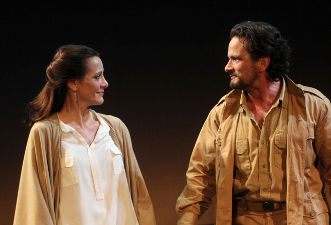
Tracy Michelle Arnold's complex portrayal of Cleopatra anchors the production. She moves with sinewy sensuality and speaks in a sexually-charged hush, but there is a loneliness in her long-distance expression that goes beyond the constant selfish calculations that are also apparent. A refined beauty with long hair styled in a variety of ways - flowing back, piled high, sexily mussed, captured in a scrunchie secured with a dagger-like pin - Arnold's Cleopatra commands the stage with elegance and vanity. Her public and private personas are built upon performance, and she moves through costume changes like a modern diva, appearing 1.1 damp and wearing only a tiny white towel before returning 1.3 in a scarlet-red dress with her hair piled high, then barefoot in 2.5 wearing emerald slacks and a slim-cut business jacket, and she arrives for the 3.4 military maneuvers like a desert soldier, sportng dark sandals and flowing tan-and-brown robes. Her affection for DeVita's burly Antony is obvious in her playful flirtation, and he pulls her into his lap 1.1 - "here is my space" - and tries to wrap her into his robe with him. Their relationship is decidedly physical and edgy - she struts onstage 1.2 wearing a blindfold and carrying a bottle of wine, he behind dutifully like a pet - and during 3.4 she rubs his shoulders as Enobarbus addresses them, becoming more blatantly physical as Enobarbus turns his back but continues speaking, and Antony caresses her in a privately affectionate public moment. During 4.4, as Antony armors himself for the battle, Cleopatra kneels in front of him provocatively - "what's this for?" - and playfully wants to try on some of the armor pieces herself.
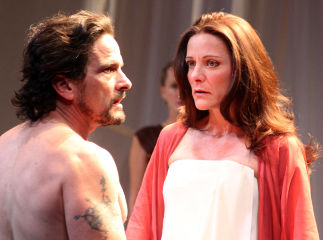
Their physical affection is on public display, and they do not appear to mind: Charmian observes them silently 1.1 from behind a filmy upstage curtain, and 1.2 Enobarbus makes a crude remark - "I have seen her die twenty times" - that he punctuates with an equally crude gesture - pretending as if he is spanking a woman - before realizing his place and snapping to military attention. Cleopatra and Antony reveal volatility as well as quickness to anger - in 1.3 he wildly pursues her around the stage before they raise fists at each other - so their relationship smacks of a callow teenaged kind of energy. By the end of the scene, Antony is hunched over with an upset stomach, perhaps real from the tension, or perhaps feigned to escape the cycle.
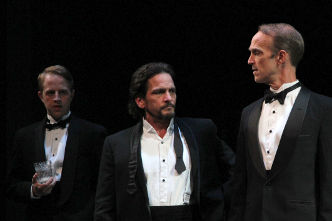
James DeVita's big-chested Antony is played with less selfish conniving than Arnold's Cleopatra, his character more a middle-aged playboy with some interestingly self-serving perspectives on loyalty - he is a married man having an affair, and he remarries quite quickly - for someone so concerned with honor and battlefield allegiance. DeVita's Antony sports long black hair, slightly curly and almost in a mullet, and he moves with a wrestler's muscular gait. He endures 1.3 in a sweater, linen pants, and dark sandals, and amid the sounds of modern war helicopters passing by overhead, he confronts Octavius Caesar 3.4, each standing on an opposite side of the marble platform at center stage. Antony seems aware of the inevitable effect his actions will have - "whatsoever comes of me, this is a soldier's kiss" - despite his 3.4 insistence on nobility: "if I lose mine honor I lose myself." During his appearance in a black tuxedo for the 2.2 celebration, he seems a little out of his element, seasoned and experienced, showing his age certainly in contrast to the younger, fair-haired and boyish Caesar. Caesar appears hopelessly immature beside DeVita's Antony, and he mumbles about disrespect 4.2 - "he calls me 'boy'" - although he reveals deep respect for Antony himself, helping Eros gather the wounded Roman general into his arms. Caesar seems to be under Cleopatra's spell, much like Antony, but when he moves behind her 5.2 with provocative proximity, Arnold's Cleopatra quickly walks downstage, and he yanks her shawl from her shoulders with wounded anger. When he takes her face in his hands to make his political proposition with a kiss, Arnold's Cleopatra - ever the pragmatist - simply kisses him back to demonstrate her supplication.
James Ridge's Enorbabus and Abbey Siegworth's Charmian are the other primary characters, and the adapters consolidate smaller roles, most notably Philo and the Soothsayer, into the parts. Ridge's Enobarbus is not the more typical no-nonsense soldier sidekick. Lean and intellectual, almost casual, he appears 1.1 in brown slacks and sweater along with sandals, a wry observer 2.2 - "the truth should be silent, I had almost forgot" - and a world-weary veteran, more than a little drunken after the 2.6 celebration. His 2.2 analysis of Cleopatra is certainly perceptive - "she makes hungry where most she satisfies" - and Ridge reveals the devastating impact of Enobarbus's inevitable abandonment of Antony, sitting with his elbows on his knees and his head in his hands, then brandishing a pistol and contemplating suicide.
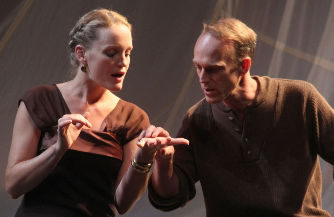
Ridge's Enobarbus has something of a relationship developing with Charmian, a conglomerate of all of Cleopatra's waiting women as well as the Soothsayer. Siegworth's tall and blonde Charmian may be the physical opposite of Arnold's Cleopatra, but she shows a similar intelligence and confidence, lustily grabbing for Enobarbus 1.2. She is the Soothsayer as well, contorting as if demonically possessed, rigid but trembling on tiptoes, neck bent, one arm twisted behind her while a thrumming tone sounds and she intones her prophesies - "there's a palm presages chastity" - with high-pitched gasps. Her "you shall outlive the lady whom you serve" prophesy carries particularly tragic resonance (as does an unspoken "but not by much") and later in 1.4 she reads Cleopatra's palm.
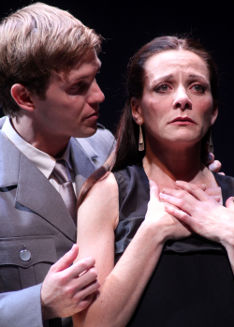
Most of the comic relief comes 2.5 from the interrogation of Eros, the messenger with the unfortunate responsibility of describing to Cleopatra the physical appearance of Antony's new wife, Octavia. Arnold's Cleopatra alternates between laser-sharp defense attorney, wounded aging beauty, and histrionic harpy, sometimes cheered on by a squealing Charmian, and sometimes cautioned, like when the Queen grudgingly mutters a warning-like "I do not like 'but yet.'" Cleopatra finally loses her self-control in the comparison to the younger Octavia, slapping Eros then knocking him down and pulling the pin from her hair to wield it like a dagger - "I'll unhair thy head!" - as Charmian tries to intervene. Arnold's Cleopatra is amusingly calm afterward, repiling her hair - "I will not bite him" - with the knife-like pick between her teeth. Later, in 3.3, she and Charmian embrace in happiness at news of Octavia - "she was a widow" - then grow stern and silent again at the news she is only thirty years of age. Moments after, Antony arrives to embrace and kiss Cleopatra while his king and father-in-law, Caesar, watches with disdain from upstage.
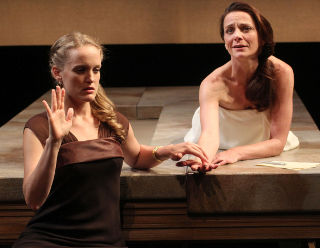
DeVita shines during the production's penultimate scenes. His fiery-proud Antony becomes buffeted with Cleopatra's political betrayals, wounded in battle and staggering to hide from searching spot lights - "I have fled myself" - on a darkened stage 3.11, then falling to his knees in tears ("no, no, no") as Cleopatra arrives from upstage to apologize and begin the cycle anew. After Cleopatra's rather wry "I kiss his conquering hand" at the invasion by Caesar, DeVita's general rallies not only himself - "I am Antony yet!" - but his fellow soldiers, prompting Enobarbus's impressed praise: "he'll outstare the lightning." DeVita's Antony seems fatalistic by 3.13 - "I'll make death love me" - but this only increases his honor as he sends Enobarbus's treasure after him, despite the betrayal, as well as his valor in 4.12 when he readies amid deep scarlet lighting to lead his navy. Music soars but the heroic Antony is crushed in his return to the stage - "all is lost" - and in his final realization: "this foul Egyptian hath betrayed me." Charmian must intercede to save Cleopatra from strangulation at the hands of Antony, and after the general succeeds in stabbing himself, Buckley shows Arnold's Cleopatra resplendent in a flowing scarlet gown.
After losing Antony, Arnold's Cleopatra returns to the stage in a funereal black gown for the final scene. Already filled with uncharacteristic self-sacrifice - "I will eat no meat" - she surveys her box of asps with a sense of old Egyptian ritualism, although Buckley and DeVita have replaced the asps with syringes full of lethal drugs. Cleopatra dies in a faithful moment - "husband, I come" - sitting upright with her arms splayed and her eyes closed. In a brilliantly fitting final moment, unapologetic and apropos to what they have meant to one another, DeVita's robed Antony reappears upstage, edging closer to Cleopatra like a benevolent ghost. He raises his hands as if casting a spell, and just before a dramatic blackout, Arnold's Cleopatra dramatically pops open her eyes.